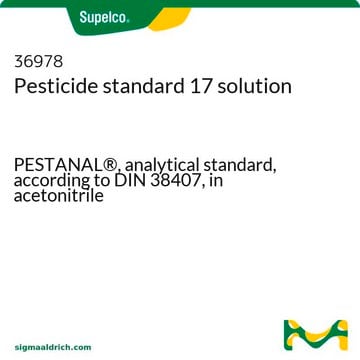36704
3,5-Dichloroaniline
PESTANAL®, analytical standard
About This Item
Recommended Products
grade
analytical standard
Quality Level
product line
PESTANAL®
shelf life
limited shelf life, expiry date on the label
technique(s)
HPLC: suitable
gas chromatography (GC): suitable
bp
259-260 °C/741 mmHg (lit.)
mp
46-52 °C (lit.)
application(s)
agriculture
environmental
format
neat
SMILES string
Nc1cc(Cl)cc(Cl)c1
InChI
1S/C6H5Cl2N/c7-4-1-5(8)3-6(9)2-4/h1-3H,9H2
InChI key
UQRLKWGPEVNVHT-UHFFFAOYSA-N
Looking for similar products? Visit Product Comparison Guide
Application
Recommended products
Legal Information
Signal Word
Danger
Hazard Statements
Precautionary Statements
Hazard Classifications
Acute Tox. 3 Dermal - Acute Tox. 3 Inhalation - Acute Tox. 3 Oral - Aquatic Acute 1 - Aquatic Chronic 1 - STOT RE 2
Target Organs
Kidney
Storage Class Code
6.1A - Combustible acute toxic Cat. 1 and 2 / very toxic hazardous materials
WGK
WGK 3
Flash Point(F)
271.4 °F - closed cup
Flash Point(C)
133 °C - closed cup
Choose from one of the most recent versions:
Already Own This Product?
Find documentation for the products that you have recently purchased in the Document Library.
Our team of scientists has experience in all areas of research including Life Science, Material Science, Chemical Synthesis, Chromatography, Analytical and many others.
Contact Technical Service










